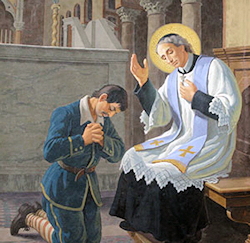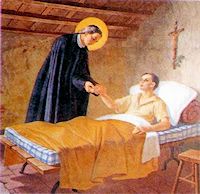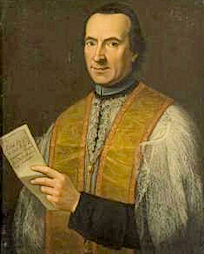Ordinary Time: May 23rd
Friday of the Seventh Week of Ordinary Time
Other Commemorations: St. John Baptist de Rossi, Priest (RM)
» Enjoy our Liturgical Seasons series of e-books!
The little town of Bethlehem is taken from two Hebrew words which mean "House of Bread." He Who called Himself "the Living Bread descended from Heaven" was born in the "House of Bread" and was laid in the place of food, the manger. The first temptation Christ had in the beginning of His public life was to become a bread King, and to win men by supplying them with food. On one occasion when they attempted to make Him King after multiplying the bread, He fled into the mountains. Rome once rang with the cry: "Bread and circuses." But the Bread that was brought at Bethlehem was an entirely different kind: "Not by bread alone does man live."
The body has its bread. Shall not the soul have its food too? Those who have nourished themselves solely on the bread of the stomach and ignored the Bread of the soul have cried out with some of the bitter disappointment of the Lord Chesterfield: "I have seen the silly rounds of business and pleasure, and have done with them all. I have enjoyed all the pleasures of the world and consequently know their futility, and do not regret their loss. Their real value is very low; but those who have not experienced them always over-rate them. For myself, I by no means desire to repeat the nauseous dose." — Archbishop Fulton J. Sheen
St. John Baptist de Rossi

After three years he was called to Rome by a relative, Lorenzo de Rossi, who was canon at St. Mary in Cosmedin. He pursued his studies at the Collegium Romanum under the direction of the Jesuits, and soon became a model by his talents, application to study, and virtue. As a member of the Sodality of the Blessed Virgin and of the Ristretto of the Twelve Apostles established at the college, he led the members in the meetings and pious exercises, in visits to the sick in the hospitals and in other works of mercy, and merited even then the name of apostle.
At the age of sixteen he entered the clerical state. Owing to indiscreet practices of mortification he contracted spells of epilepsy, notwithstanding which he made his course of scholastic philosophy and theology, in the college of the Dominicans, and, with dispensation, was ordained priest on 8 March, 1721. Having reached the desired goal, he bound himself by vow to accept no ecclesiastical benefice unless commanded by obedience. He fulfilled the duties of the sacred ministry by devoting himself to the laborers, herds, and teamsters of the Campagna, preaching to them early in the morning, or late in the evening, at the old Forum Romanum (Campo Vaccino), and by visiting, instructing, and assisting the poor at the hospital of St. Galla. In 1731 he established near St. Galla another hospital as a home of refuge for the unfortunates who wander the city by night ("Rom. Brev.", tr. Bute, Summer, 573).
In 1735 he became titular canon at St. Mary in Cosmedin, and, on the death of Lorenzo two years later, obedience forced him to accept the canonry. The house belonging to it, however, he would not use, but employed the rent for good purposes.
 For a number of years John was afraid, on account of his sickness, to enter the confessional, and it was his custom to send to other priests the sinners whom he had brought to repentance by his instructions and sermons. In 1738 a dangerous sickness befell him, and to regain his health he went to Cività Castellana, a day's journey from Rome. The bishop of the place induced him to hear confessions, and after reviewing his moral theology he received the unusual faculty of hearing confessions in any of the churches of Rome. He showed extraordinary zeal in the exercise of this privilege and spent many hours every day in hearing the confessions of the illiterate and the poor whom he sought in the hospitals and in their homes. He preached to such five and six times a day in churches, chapels, convents, hospitals, barracks, and prison cells, so that he became the apostle of the abandoned, a second Philip Neri, a hunter of souls.
For a number of years John was afraid, on account of his sickness, to enter the confessional, and it was his custom to send to other priests the sinners whom he had brought to repentance by his instructions and sermons. In 1738 a dangerous sickness befell him, and to regain his health he went to Cività Castellana, a day's journey from Rome. The bishop of the place induced him to hear confessions, and after reviewing his moral theology he received the unusual faculty of hearing confessions in any of the churches of Rome. He showed extraordinary zeal in the exercise of this privilege and spent many hours every day in hearing the confessions of the illiterate and the poor whom he sought in the hospitals and in their homes. He preached to such five and six times a day in churches, chapels, convents, hospitals, barracks, and prison cells, so that he became the apostle of the abandoned, a second Philip Neri, a hunter of souls.
In 1763, worn out by such labors and continued ill-health, his strength began to ebb away, and after several attacks of paralysis he died at his quarters in Trinità de' Pellegrini. He was buried in that church under a marble slab at the altar of the Blessed Virgin. God honoured his servant by miracles, and only seventeen years after his death the process of beatification was begun, but the troubled state of Europe during the succeeding years prevented progress in the cause until it was resumed by Pius IX, who on 13 May, 1860, solemnly pronounced his beatification. As new signs still distinguished him, Leo XIII, on 8 December, 1881, enrolled him among the saints.
—Excerpted from The Catholic Encyclopedia
Patronage: of the abandoned
Highlights and Things to Do:
- Read the life of St. John Baptist de Rossi free at Google Books
- Read more about St. John Baptist de Rossi:
- His relics are located in Rome at the Church of San Giovanni Battista de Rossi.






